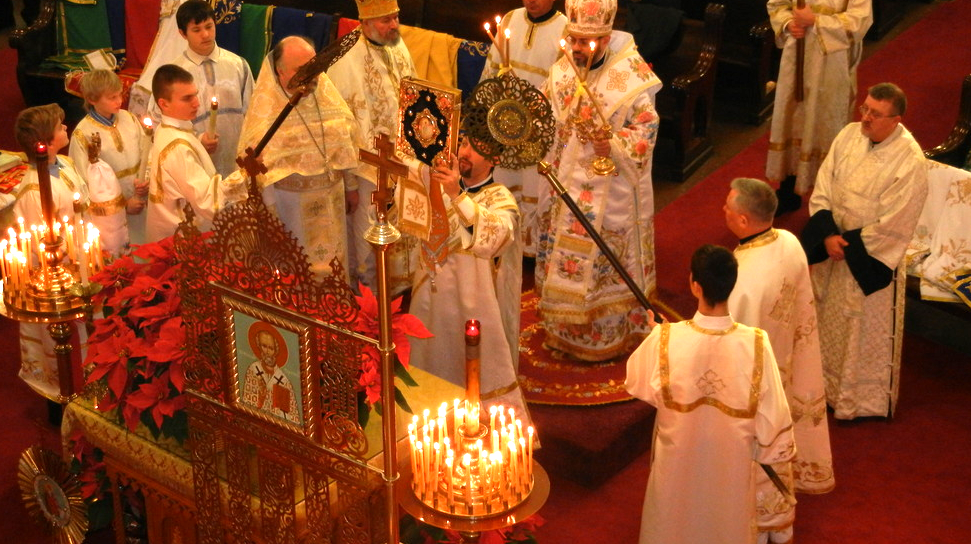
by Fr. Jonathan Cholcher
In the Western, Roman Catholic Christian tradition, the Feast of our Lord’s Birth on December 25 is followed by the Feast of Epiphany on January 6, sometimes called the Gentile Christmas as it commemorates the visit of the Magi to worship Christ (Matt. 2:1-12). Thus there are 12 days between these two feasts, the 12 days of Christmas.
In the Orthodox tradition which precedes the Western reckoning, the Feast of Christmas is likewise followed by another great feast on January 6 called Theophany (also, Epiphany), or the Feast of our Lord’s Baptism. In the Orthodox Church, the visit of the Magi (Matt. 2:1-12) is the culminating action of the singular event of Christ’s birth commemorated on December 25. This feast gives way, or rather, is fulfilled in the great feast of Theophany on which God the Holy Trinity’s appearance to the world took place when Christ was baptized in the Jordan River by His Forerunner, John the Baptist.
The Twelve Days of Christmas, then, celebrate our Lord’s Incarnation (lit., “enfleshment”) and point to the ultimate purpose of His birth in the flesh, that is, the Son of God becoming Man that we men (human beings) might become divine in Him. This purpose was revealed at Christ’s Baptism in the Jordan, for at Christ’s Baptism God sanctified the waters by which we are born anew into the divine life of the Kingdom of God.
Before expounding the connection with Christ’s Baptism, the 12 days of Christmas provide an opportunity to realize that the Son of God truly became Man for our salvation. For this we celebrate and give thanks to almighty God. In Orthodoxy, the 12 days of Christmas are fast-free, opposite the 40 day-long Advent Fast preceding Christmas. During the 12 days of Christmas there are no restrictions on the types of food and drink allowed to the faithful. This is not a license for gluttony and drunkenness, but expression of a theological truth that in becoming fully human, Christ sanctified everything given us by God for our enjoyment and good. “For every creature of God is good, and nothing is to be refused if it is received with thanksgiving; for it is sanctified by the word of God and prayer” (1 Tim. 4:4-5).
What is the significance of the Incarnation of the Son of God? “But when the fullness of time had come, God sent forth His Son born of a woman, born under the law, to redeem those who were under the law, that we might receive adoption as sons” (Gal. 4:4-5; the Epistle reading for Christmas Day). Further: “Inasmuch then as the children have partaken of flesh and blood, [Jesus] Himself likewise shared in the same, that through death He might destroy him who had the power of death, that is, the devil, and release those who through fear of death were all their lifetime subject to bondage” (Heb. 2:14-15).
Redemption from the bondage to sin and death exposed by the Law is the purpose of the Incarnation of the Son of God, first indicated eight days after Christmas with His circumcision in the flesh (January 1). Here the Son of God, the Giver of the Law of the Covenant, voluntarily submits Himself to that law in order to fulfill and redeem the people of His own covenant. Christ’s submission to circumcision begins His formal submission to the entire Law of the Covenant. “[E]very man who becomes circumcised is a debtor to keep the whole law” (Gal. 5:3). The fact that Christ can, indeed, be circumcised in the flesh means that He is truly a human being, that the Incarnation is not an illusion, and that human beings are called to keep the will of God in Him.
Circumcision was the “sign of the covenant” between God and His people (Gen. 17:11). Jesus came not “to destroy the Law and the Prophets, but to fulfill” (Matt. 5:17). Even as God commanded in the Old Covenant to “circumcise the foreskin of your heart, and do not be stiff-necked any longer” (Deut. 10:16), so now in Christ, the act of circumcision is shown fully to be not merely in the flesh, but to be “the circumcision made without hands, by putting off the body of the sins of the flesh by the circumcision of Christ, buried with Him in baptism, in which you were also raised with Him through faith in the working of God, who raised Him from the dead” (Col. 2:11-12).
The Incarnation of the Son of God, therefore, is more than just becoming man, that is, to use language popular in today’s society, more than an affirmation of our humanity. The Incarnation certainly affirms that human nature is fundamentally good according to God’s creation (see Gen. 1:31), but it also confirms that our human nature is in need of rebirth and renovation from the infection of sin and death. Only the Son of God in the flesh can purify us and restore our nature to its original purpose, to be a participant in the divine life of God Himself. Baptism is the means of that restoration in Christ, and by His baptism in the Jordan River, Christ provides that rebirth to all.
In the early Church of roughly the eastern half of the Roman Empire (in Cappadocia (modern day Turkey), Syria, and Egypt), Christians celebrated the birth of Christ and His baptism together on January 6. Beginning in the western half of the Empire, the Church celebrated the birth of Christ alone on December 25, a practice imported to the east (e.g., St. John Chrysostom) in the late fourth century. The celebration of the baptism of Christ on January 6 also included the blessing of water because, by His baptism in the Jordan, Christ Jesus sanctified the waters making them the instrument of Christian baptism into Christ.
Our Lord told Nicodemus, “Most assuredly, I say to you, unless one is born again, he cannot see the kingdom of God…unless one is born of water and the Spirit, he cannot enter the kingdom of God…You must be born again” (John 3:3, 5, 7). Christ Himself demonstrated the way of this new birth by His own baptism for our sake. St. John declared: “I did not know Him, but He who sent me to baptize with water said to me, ‘Upon whom you see the Spirit descending, and remaining on Him, this is He who baptizes with the Holy Spirit” (John 1:33; see Matt. 3:13-17; Mk. 1:9-11; Lk. 3:21-22).
Before ascending bodily into heaven, the Lord Jesus gave this command: “Make disciples of all nations baptizing them in the name of the Father and of the Son and of the Holy Spirit…” (Matt. 28:19). The Apostle Paul writes: “[A]ccording to [God our Savior’s] mercy He saved us, through the washing of regeneration and renewing of the Holy Spirit, whom He poured out on us abundantly through Jesus Christ our Savior” (Titus 3:5-6).
The blessing of water that takes place in and outside the Orthodox churches on the Feast of Theophany (January 6; e.g., at a local river or lake) is the same blessing for the water set aside for every baptism in the Church. In the Church, water becomes not only the means for the spiritual rebirth in Holy Baptism, but a means of blessing every aspect of our lives. “You will draw water with gladness from the wells of salvation. In that day, you will say, ‘Praise the Lord; call upon His name. Declare His glorious things among the Gentiles and make mention that His name is exalted” (Isa. 12:3-4).
Following the Feast of Theophany – literally, the “appearance of God” the Holy Trinity at Christ’s baptism – water blessed in the Church is available for the faithful to drink and sprinkle about their homes for spiritual cleansing, As baptized Christians, every aspect of our lives is to receive the blessing of baptism, that is, purification from sin and evil and dedication to the service of God. After the Feast of Theophany the Priest blesses homes with the Holy Water praying and conversing with Christian families as their households are now little churches by the grace of God.
Our adoption as sons and daughters of God in Baptism results directly from God the Son becoming the Son of Man and revealing that connection at His own baptism. Thus Christmas forms one end and Theophany (the Baptism of Christ) the other end as the axis upon which our salvation turns in God’s design. This is the content of the Twelve Days of Christmas preparing us to experience the culminating mysteries of Christ: His suffering, crucifixion, resurrection, ascension, and pouring out of the Holy Spirit, that we continuously strive to become more and more like God by grace as He has become one of us by nature.
